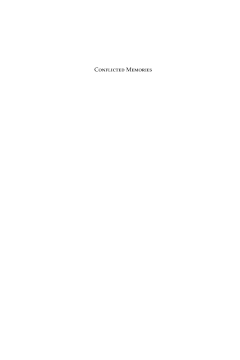
Additional Information
Book Details
Abstract
Despite the growing interest in general European history, the European dimension is surprisingly absent from the writing of contemporary history. In most countries, the historiography on the 20th century continues to be dominated by national perspectives. Although there is cross-national work on specific topics such as occupation or resistance, transnational conceptions and narratives of contemporary European history have yet to be worked out. This volume focuses on the development of a shared conception of recent European history that will be required as an underpinning for further economic and political integration so as to make lasting cooperation on the old continent possible. It tries to overcome the traditional national framing that ironically persists just at a time when organized efforts to transform Europe from an object of debate to an actual subject have some chance of succeeding in making it into a polity in its own right.
Thomas Lindenberger is project leader at the Zentrum für Zeithistorische Forschung Potsdam and teaches at Potsdam University. His current research interests center on questions of mass media in the Cold War as well as on issues of historical methodology and theory. His publications include Öffentliche Polizei im Staatssozialismus: Volkspolizei, SED-Staat und Herrschaftspraxis, 1952-1968 (Köln et al. 2003); and the edited volumes Herrschaft und Eigen-Sinn in der Diktatur: Studien zur Gesellschaftsgeschichte der DDR (Köln 1999) and Massenmedien im Kalten Krieg: Akteure, Bilder, Resonanzen (Cologne, 2006).
Konrad H. Jarausch is director of the Zentrum für Zeithistorische Forschung Potsdam and Lurcy Professor of European Civilization at the University of North Carolina in Chapel Hill. His research interest is currently focused on the German unification in 1989/90, the nature of the East German dictatorship and the problem of interpreting 20th-century German history in general. His publications include The Shattered Past: Reconstructing German Histories with Michael Geyer (Princeton 2002) and Die Umkehr: Deutsche Wandlungen 1945-1995 (München 2004).
